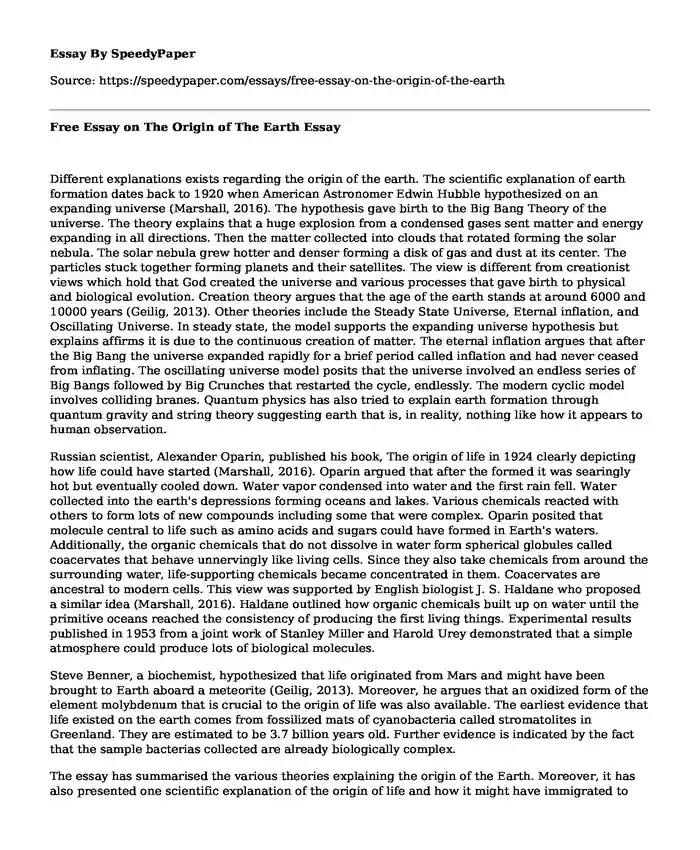Different explanations exists regarding the origin of the earth. The scientific explanation of earth formation dates back to 1920 when American Astronomer Edwin Hubble hypothesized on an expanding universe (Marshall, 2016). The hypothesis gave birth to the Big Bang Theory of the universe. The theory explains that a huge explosion from a condensed gases sent matter and energy expanding in all directions. Then the matter collected into clouds that rotated forming the solar nebula. The solar nebula grew hotter and denser forming a disk of gas and dust at its center. The particles stuck together forming planets and their satellites. The view is different from creationist views which hold that God created the universe and various processes that gave birth to physical and biological evolution. Creation theory argues that the age of the earth stands at around 6000 and 10000 years (Geilig, 2013). Other theories include the Steady State Universe, Eternal inflation, and Oscillating Universe. In steady state, the model supports the expanding universe hypothesis but explains affirms it is due to the continuous creation of matter. The eternal inflation argues that after the Big Bang the universe expanded rapidly for a brief period called inflation and had never ceased from inflating. The oscillating universe model posits that the universe involved an endless series of Big Bangs followed by Big Crunches that restarted the cycle, endlessly. The modern cyclic model involves colliding branes. Quantum physics has also tried to explain earth formation through quantum gravity and string theory suggesting earth that is, in reality, nothing like how it appears to human observation.
Russian scientist, Alexander Oparin, published his book, The origin of life in 1924 clearly depicting how life could have started (Marshall, 2016). Oparin argued that after the formed it was searingly hot but eventually cooled down. Water vapor condensed into water and the first rain fell. Water collected into the earth's depressions forming oceans and lakes. Various chemicals reacted with others to form lots of new compounds including some that were complex. Oparin posited that molecule central to life such as amino acids and sugars could have formed in Earth's waters. Additionally, the organic chemicals that do not dissolve in water form spherical globules called coacervates that behave unnervingly like living cells. Since they also take chemicals from around the surrounding water, life-supporting chemicals became concentrated in them. Coacervates are ancestral to modern cells. This view was supported by English biologist J. S. Haldane who proposed a similar idea (Marshall, 2016). Haldane outlined how organic chemicals built up on water until the primitive oceans reached the consistency of producing the first living things. Experimental results published in 1953 from a joint work of Stanley Miller and Harold Urey demonstrated that a simple atmosphere could produce lots of biological molecules.
Steve Benner, a biochemist, hypothesized that life originated from Mars and might have been brought to Earth aboard a meteorite (Geilig, 2013). Moreover, he argues that an oxidized form of the element molybdenum that is crucial to the origin of life was also available. The earliest evidence that life existed on the earth comes from fossilized mats of cyanobacteria called stromatolites in Greenland. They are estimated to be 3.7 billion years old. Further evidence is indicated by the fact that the sample bacterias collected are already biologically complex.
The essay has summarised the various theories explaining the origin of the Earth. Moreover, it has also presented one scientific explanation of the origin of life and how it might have immigrated to Earth.
References
Marshall, M. (2016, April 19). The secret of how life on Earth began. Retrieved from http://www.bbc.com/earth/story/20161026-the-secret-of-how-life-on-earth-began
Geilig, N. (2013, August 28). Did Life Come to Earth From Mars? Retrieved from https://www.smithsonianmag.com/science-nature/did-life-come-to-earth-from-mars-2378085/
Cite this page
Free Essay on The Origin of The Earth. (2022, Nov 22). Retrieved from https://speedypaper.net/essays/free-essay-on-the-origin-of-the-earth
Request Removal
If you are the original author of this essay and no longer wish to have it published on the SpeedyPaper website, please click below to request its removal:
- Autobiography and Biography as a Form of Genre, Essay Example
- The Perfect Wife - Free Essay with Creative Writing Example
- Good Representative - Essay Example
- The Lady's Dressing Room - Poem Analysis Essay Sample
- Homeland Security Essay Sample
- Free Essay on How Liberals and Conservatives Report NFL
- Paper Example: Appraise Staff Performance
Popular categories





